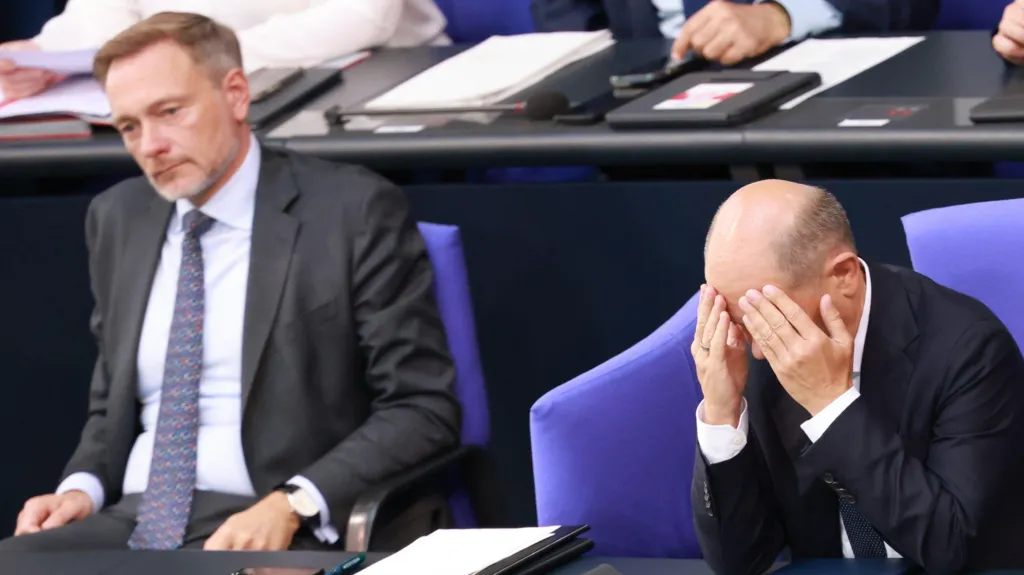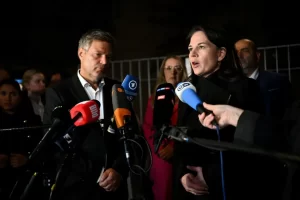German coalition collapses after Scholz fires key minister
4 min read
Finance Minister Christian Lindner (L) and Chancellor Olaf Scholz had reportedly been at loggerheads in recent weeks. BBC

Finance Minister Christian Lindner (L) and Chancellor Olaf Scholz had reportedly been at loggerheads in recent weeks. BBC
Germany’s ruling coalition has collapsed after Chancellor Olaf Scholz dismissed a key minister, signaling a deep political crisis that could lead to early elections. The chancellor expressed a complete loss of trust in Finance Minister Christian Lindner, leader of the pro-business Free Democrats (FDP), whose party had been part of the coalition alongside Scholz’s Social Democrats (SPD) and the Greens. Scholz announced that he would call a vote of confidence in the government early next year, setting the stage for a turbulent political period.
The move plunged Europe’s largest economy into uncertainty, especially after the election of Donald Trump in the US, which had already raised concerns about Europe’s future stability. President Frank-Walter Steinmeier urged political leaders to focus on responsibility and avoid further division, saying, “This is no time for tactics and squabbling, but for reason and responsibility.”
The coalition, known as the “traffic light” alliance due to its three constituent parties—SPD (red), FDP (yellow), and the Greens (green)—has governed Germany since 2021. However, the dismissal of Lindner has left Scholz’s government without a parliamentary majority, making the situation more precarious.
A confidence vote will take place on January 15, 2024. If the government fails to secure a majority, Germany could face early elections, potentially as soon as March. However, opposition leaders argue the vote should be held sooner, with Christian Democratic Union (CDU) leader Friedrich Merz stressing that a government without a majority cannot be sustained for several months.
Tensions within the coalition had been simmering for weeks, particularly over disagreements about Germany’s 2025 budget. Scholz and his Green allies were pushing to loosen the country’s strict fiscal rules to increase government spending, especially on defense and social programs, as Germany faces economic stagnation and the ongoing costs of supporting 1.5 million Ukrainian refugees. In contrast, Lindner, advocating for fiscal discipline, opposed easing the debt brake—Germany’s constitutional requirement to balance the federal budget.
The crisis exploded publicly on Wednesday night after Scholz accused Lindner of “betraying his trust” by prioritizing his party’s interests over the country’s needs. The chancellor warned that Germany must demonstrate reliability, particularly in the face of growing instability in the international arena following Trump’s victory.
Lindner, who had resisted Scholz’s demand for greater fiscal flexibility, fired back, accusing the chancellor of leading the country into a phase of uncertainty. “The way forward requires certainty, not confusion,” Lindner stated, signaling a significant rift within the governing coalition.

In the aftermath of Lindner’s dismissal, two other FDP ministers resigned from their posts, though Volker Wissing, the transport minister, decided to remain in office but step down from his party. Meanwhile, the Greens have stated they will not leave the government and will continue to hold their positions.
Foreign Minister Annalena Baerbock, a member of the Greens, expressed concern over the political instability, saying, “This is not a good day for Germany, and not a good day for Europe.” Scholz, however, insists that the confidence vote will allow the country to resolve the crisis and restore stability.
Should the confidence vote fail, it would likely lead to snap elections, throwing the country into political turmoil. The collapse of the coalition represents a major challenge for Scholz, who will now need to govern with a minority government, relying on support from other parties to pass legislation. This scenario makes it harder to enact key policies, including measures to address the country’s economic troubles and increase defense spending.
In a bid to stabilize his government, Scholz has appointed Jörg Kukies, a former senior economic official, as Lindner’s replacement. Scholz will now look to negotiate with opposition parties to secure support for vital measures, especially those aimed at strengthening Germany’s ailing economy and military capabilities.
Despite the upheaval, Scholz remains determined to move forward with his legislative agenda. His government will need to navigate a deeply fragmented political landscape, where the opposition parties, led by the CDU, are poised to capitalize on the coalition’s collapse.
The collapse of the traffic light coalition marks a significant turning point in German politics, with broader implications for Europe. As the country grapples with its internal political challenges, the government’s ability to respond to external threats and economic pressures remains uncertain. The coming months will likely determine whether Scholz can hold his government together or whether Germany will be headed toward early elections.